Report on streaming support scheme for independence of children and survivors with childhood cancer. 3. Report on the cooperation cases of medical welfare and school education in Finland.
HOME > Research and other medical related news > Research and accomplishment
- 2012.4. 2
The cooperation cases of medical welfare and school education in Finland
Akiko Kakinuma, Social Welfare Corporation Habataki Welfare Project
 Why Finland?
Why Finland?
Social system based on multidisciplinary educational support in Finland is flexibly capable of corresponding to social gap.
According to Programme for International Student Assessment (PISA) organized by Organisation for Economic Co-operation and Development (OECD), Achievement and proficient gap among finnish students are very little compared with other countries students. Meanwhile, the gaps between students remain large in Germany and America. There are many excellent students but the average is low.
This suggests that the idea of ground design for children health and development is very important from the standpoint of fairness and equality in patients with chronic diseases. Earlier study suggests that patients with chronic diseases have many difficulties. Especially, independence is hallmark of their problems. Program and system is essential element to carry out their independence.
Reference
1) PISA Results enable (OECD PISA survey report 2009)
Aim of this research
This research aim is to create the program and system that comprehensively support school life and hospital during child development in order to enable children with chronic illness to live independently as a member of society.
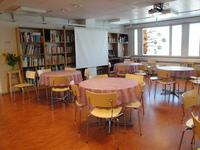 Research methods
Research methods
In this year’s study we visited children hospital, school in hospital, integrated school and special vocational school and identified their characterization to investigate the cooperation cases of medical welfare and school education in Finland. The report of these published articles is based on our earlier studies such as
“Development of program to extract difficulties with independence faced by pediatric cancer survivors” (2009, Heisei 21) and “Survey on interview with the use of England program as earlier study” (2010, Heisei 22).
The essence of this research
1: Ground design and education concept in Finnish education system. Finland creates the scheme of education equality keeping fair line between education chances and learning effect. They have basic policy as follows: If children can’t go to school because of medical or other characteristic reason, local government is mandatory to provide other education facility with them and disabled or children with different background should not be unfavorably treated, considering different developmental stages of children.
From the standpoint of view, we investigated comprehensive support for children with pediatric cancer or chronic illness.
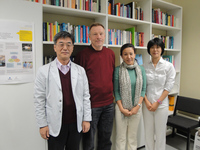 2 Program development and practice based on theoretical background
2 Program development and practice based on theoretical background
There is little known about the study from the viewpoint of cooperation although domestic education and welfare relevant have already conducted many surveys on this issue.
Therefore, we investigated this study with multidisciplinary approach in collaboration with medical care, welfare and education researcher.
Through the viewpoint of study, it is important key elements to require as well as integrate each division with expertise.
To introduce and develop productive program, we asked
Yrjö Engeström, Professor of Helsinki university to teach activity theory that plays an important role in coordinating multidisciplinary approach. We look at the whole picture from development of program to practice.
He told us as follows: the point is to continue to manage and administrate the program, it is important to keep in touch with medical care, welfare, education and community and conduct the theory on site. However, it is suggested that direct introduction of Finland education is difficult in Japan.
The essence of activity theory.
1) Add pressure on relevant people to “change” their attitude and behavior.
2) Don’t blacken someone to keep secure and relieved
3) To find out problem in system.
4) Clarify those most affected not to cover up the problem
He proposed four points above and encouraged us to conduct a practice while having repeated meetings and figuring out the critical problem.
3: Rethinking the independence in education. Introduction of viewpoint of concerned people.
There are various definitions involved in the term of independence.
Ms. Tomoko Omata, survivor of pediatric cancer considered the term interpretation as follows: when using the term of independence, the meaning seems to be different depending on the various situation and conditions. According to the dictionary (Daijirin), the term “independence” means person can do something for himself/herself without receiving an assist from others.
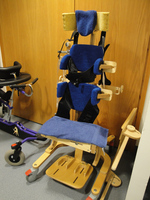 4: Cooperation with education, medical care, welfare and community in practice
4: Cooperation with education, medical care, welfare and community in practice
Medical care is indispensable for patients with chronic illness. Child development, especially education period is very important to become a member of society as a person. There are two types of patients with chronic illness. One is independent and the other is not dependent. It reveals that child development, especially education period is very important on the basis of earlier study on independence.
Referring to research report from National Center for Child Health and Development, we conducted the research considering medical welfare from the viewpoint of education. What is education for children with pediatric cancer and chronic illness from the perspective of on-education site? How is collaborating with education, medical care, welfare and community?
I report the following topics.
5: Practice in Finland child health and development and education.
Finland educators energetically made efforts focusing on child education during growing and developing. This is their philosophy based on the words of director of Tororari nursery school” Education for children with a limited expectancy for future”. In accordance with his verbal sentences, they conduct the future education for even severe disease children with limited expectancy.
6: The basic concept of child health and development in Finland
In order to gain the independence of these children, what is ideal position for community society that has medical welfare and school education? Integrated school teacher comments that awareness through the experience from learning different children together is also important for all children in response to this question. They don’t accept their environment smoothly at the beginning. As times pass on, they gradually adjust their new situation. Most of children have a school experience together with disabled or disease one in regular class. This implicates two significant meanings as follows:
1) They propose the practical meaning of having a school life with healthy and disabled or disease children together. Basically, disabled or disease children are prone to be reared and grown up in a closed society especially, human relationship. Though it is thought that it doesn’t significantly influence on progress on school work, it will make an impact their health life and independence of their future in the long run.
2) Not only disabled or disease children but also healthy children in integrated school are required to learn important lessons, namely, there are a variety of people in this world. It is clearly much more efficient than bringing an action such as normalization for adult. It is assumed that normalization is widespread in the way of life in Finland.
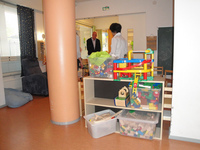 7:Daily life in Finland integrated school
7:Daily life in Finland integrated school
The primary aim of integrated school is not merely to provide the learning experience for children with special education and healthy children but to consider their overall health and independence corresponding to them, provide individual curriculum in response to their needs, distribute proper educator and conduct plenty of supports with multidisciplinary cooperation. They also take a view and hold frequent meetings with therapist, physician, social worker and their family. If necessary, assistants accompany and support their daily life in agreement with their parents. Let’s take an example.
They help disabled or disease children to get out of bed and feed in time for school.
It is obvious that relevant related to school and health care providers and coordinators based on their community that play an important role in conducting these tasks.
Coordinators are responsible for taking care of children as well as their parents. This role is equivalent to health nurse and social worker in Japan. Because of insufficient relationship between medical care and education, it is assumed to be difficult to acquire a new relation. Conversely, we think that coordinators have a possibility to overcome these obstacles.
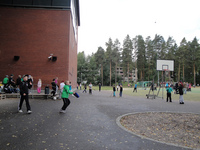 8: Daily activities of special vocational school in Finland.
8: Daily activities of special vocational school in Finland.
Special vocational school has a key role in the next stage of development and growth for independence. When visiting this facilities, teachers pointed to their photos and essays on the wall and explained us how they different to others, analyzed their environment and expressed their feelings for themselves. In addition, they admitted that they were unable to do something due to their disability and notification is necessary as long as they live in this society. The principle of difference is not to mention about “good” or “bad” but approve the fact that they are different. They should admit they are different and analyze the difference. Description of their position for themselves is important in order to live their social life. They learned these fundamental lessons through this vocational school not to speak of training.
Individual curriculum is prepared for persons with special needs. This is established by law. Curriculum is discussed and arranged by persons with special needs, teacher, health nurse, a doctor of psychiatry, persons who make a special program. After completion of this course, they can consult with their local social worker about their future. Furthermore, vocational school has another role in promoting job assistance. Financial resource in this school is organized by foundation though government covers a huge amount of money to their budget. Regarding main reason about this, they think that it will pay off if we invest them now.
If they invest them on education. Many people will obtain a chance to work and the country will be a rich at last.
Summary
According to the survey on Finland education system, we obtained important perspectives towards the development of program to support independence of children with chronic illness in the future. Our next challenging is to develop an efficient program in collaboration or cooperation with government. We propose government that they have a clear and an active vision about medical care for development of children, ensuring and rearing persons with coordinator.
While we focus on the development of program, Stable and continuous management is indispensable for activity theory. This is our challenging for further studies.


 お問い合わせ
お問い合わせ